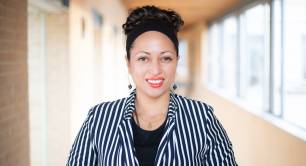UK social investors primed to take on inequality – but data suggest tough road ahead
Impact investing can be a “powerful tool” to tackle inequality across the UK – one of the most unequal countries in the rich world – according to the head of impact investment in the government’s inclusive economy unit.
Alison Jeffrey, whose role sits in the Department for Digital, Culture, Media & Sport (DCMS), said there was “clear commitment” throughout government to its so-called “levelling up” agenda, which aims to even out socio-economic gaps between regions of the UK. Westminster has committed a total of £5.17bn to three levelling up funds. But government money alone would not be enough, she said, leaving a “really clear role” for impact investment.
Speaking at last week's Levelling Up event, co-hosted by the Equality Impact Investing Project and Pioneers Post, Jeffrey said growing interest of financial markets plus more availability of investable prospects that could deliver benefits including affordable housing, inclusive employment or community energy offered “a real moment of action”.
I truly believe that impact investment can be a powerful tool to help us to achieve that equity
“We want to enable impact investment to play a role in distributing these benefits equally across geographies. And I truly believe that it can be a powerful tool to help us to achieve that equity.”
|
Four ways impact investors can address inequality
Read more at equalityimpactinvesting.com |
Dr Wanda Wyporska, director of the Equality Trust, highlighted the “very high and damaging” levels of inequality that were “tearing apart” the UK’s social fabric. Efforts to level up needed to ensure a dignified standard of living: “In the world’s fifth or sixth largest economy, we really shouldn't be having to say this here – but we need to ensure that people have access to education, to housing, to food, to those very, very basic things.”
The Equality Impact Investing Project (EIIP) aims to play its part in this by encouraging investors to explicitly address equality, for example by investing in organisations led by traditionally marginalised groups or by prioritising those with excellent equality and diversity practice (see box).
“There is no such thing as an ‘equality-neutral’ investor or investment,” said EIPP director Ceri Goddard. “Whatever you do, it’s either going to have a positive or a negative impact on inequality. Ideally you want to not be making things worse, and at best you want to be getting at the root causes of inequality.”
There is no such thing as an ‘equality-neutral’ investor or investment. Whatever you do, it’s either going to have a positive or a negative impact
‘Very clear interest’ among investors
EIPP first began as a research project in 2016 and is now funded by the Connect Fund and DCMS. It recently ran an equality impact investing training programme, attended by 85 UK organisations.
Speakers at last week's event suggested there was significant appetite to learn more.
Matt Smith, CEO of social investor Key Fund which works in the north and midlands of England, said fairness had been a major motivator in his career – and that he saw similar commitment among other members of the Social Investment Forum, which he chairs.
“I see that strongly, I hear that in the words that people speak but also in the values that they show. So I think there’s a very clear interest in both levelling up, but also inequality within that.”
Some 80% of Key Fund’s investments go to the top 30% most deprived communities. But, Smith said, “we’ve known for a long time, and many of us in the sector have known for a long time, that there’s more that needs to happen.”
|
Could you be the UK's Social Investment Award winner of 2021? We're on the hunt for the UK's social investment deal of the year. If you've been involved in a groundbreaking or innovative social investment – perhaps one that demonstrates equality impact investing in practice – be sure to apply for this year's NatWest SE100 & Social Business Awards. Find out more and apply by 25 April. |
Access Foundation CEO Seb Elsworth described the EIIP framework as a “really important way” of thinking about how to drive more money into social enterprises based in disadvantaged communities.
The efficiency and economic power of social enterprises as job creators was “often overlooked”, for example – they created more jobs relative to turnover than mainstream businesses, and since they were more likely to be based in disadvantaged areas, employment they generated could make a big impact, said Elsworth.
Blended finance (a mix of grant and loan money) could be “critical” in backing such enterprises: the Access Growth Fund had invested more than half of its £35m to date into the most deprived one-third of England’s communities and helped capital to reach smaller organisations, many of which were led by people from ethnic minority groups.
Many of us in the sector have known for a long time that more needs to happen
But subsidised money would need to be long term, Elsworth said. The Access Foundation is due to wind up in 2025 and the government and others should commit to filling any gaps, he suggested.
There was also a mismatch of scale: investors wanted large-scale initiatives for the sake of efficiency, which would not necessarily work at a local level. “We need to think about that balance between how we tailor programmes to focus on the needs of individual communities, but also allow… capital to flow in at scale,” Elsworth said.
Minority-led organisations missing out
Genevieve Maitland Hudson, director of learning at the Social Investment Business, said their research had raised “really interesting questions around fairness and around the systems that we use for decision making”.
Analysis of applications to its various funds revealed a “staggering conversion statistic”, for example: for one fund, of 55 applicants from black or minority ethnic (BAME) backgrounds, only three had gone on to receive a loan.
BAME applicants are far less likely to receive funding
“BAME applicants are far less likely to receive funding. They ask for less money, they receive less money, they are more likely to be filtered out on eligibility,” she said. This was partly because BAME-led organisations were likely to be smaller, more financially fragile and more impacted by the Covid-19 pandemic than others. To access investment, such organisations needed “consistent support”. But they were also “far more likely to come from high-deprivation areas”, so reaching such groups more successfully would be a “double” achievement for equality investing.
The Social Investment Business had also seen far higher numbers of applications from London-based organisations compared to non-London ones – yet their data showed that the greatest economic fallout from Covid-19 would be felt outside the capital.
Investors needed therefore to “really, really apply that EIIP approach of being very intentional about the way that we manage those differences”, said Maitland Hudson.
Header image: An event hosted by London-based innovation organisation Do it Now Now, which supports black communities around the world. In 2020 it launched the UK's first grant fund dedicated to black-led social impact organisations (credit: Do it Now Now)
Thanks for reading Pioneers Post. As an entrepreneur or investor yourself, you'll know that producing quality work doesn't come free. We rely on our subscribers to sustain our journalism – so if you think it's worth having an independent, specialist media platform that covers social enterprise stories, please consider subscribing. You'll also be buying social: Pioneers Post is a social enterprise itself, reinvesting all our profits into helping you do good business, better.




